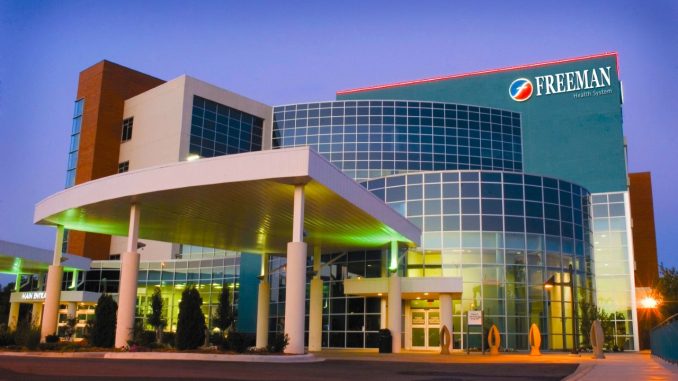
(Joplin, MO) – Three Freeman Health System orthopaedic surgeons — Dr. Derek Miller, Dr. Robert Lieurance, and Dr. Thomas Sanders — are the first and only physicians in southwest Missouri to utilize the CORI Surgical System®, a robotic-assisted computerized tool that has proven revolutionary when it comes to partial and total knee replacement surgeries.
Thanks to detailed computer scans and a nimble handheld tool, the system adds an extra layer of pre-surgical planning to surgeries along with improved cutting precision that was almost unheard of 20 years ago.
“The difference is in the precision,” Dr. Miller said, who has performed more than 100 CORI-assisted surgeries. “The robot allows me to prepare bone down to a tenth of a millimeter throughout. This is an accuracy that we’ve never had before. CORI is a true paradigm shift when it comes to knee surgeries. I wasn’t sure if this much progress would take place in my lifetime.”
The basic concept behind knee replacement surgery hasn’t changed with CORI’s introduction. The three surgeons are still replacing the damaged portions or an entire arthritic knee joint with a prosthetic implant designed to replicate the person’s natural knee joint in shape, motion, and stability.
“We have used essentially the same cutting guides for total knee arthroscopy for the last 30 to 40 years so this is certainly an improvement from a technology standpoint and allows ‘real time’ adjustments with the precision and assistance of a computer,” Dr. Lieurance said, who performed Freeman’s first-ever CORI surgery on January 12, 2024.
Prior to surgery, the CORI system eliminates the need for timely and expensive CT scans.
“It’s completely image free, meaning we don’t have to pre-load a CT scan, x-ray, or MRI into the computer. Most other systems you see around (Joplin) require a long CT scan from the hip down through the ankle,” Dr. Miller said.
“CORI has allowed us as surgeons to ‘map’ each individual’s knee anatomy in live time… program the amount and level of bone to resect as well as adjust rotation of the implants to best balance each individual’s knee replacement and give a more custom total knee replacement that’s individualized to each patient,” said Dr. Lieurance.
“It’s a tremendous amount of potentially harmful radiation and, quite honestly, a large expense,” added Dr. Miller, “since many insurance companies are now denying CT scans, deeming it an unnecessary expense.”
CORI’s other primary benefit is the robotic assistance it offers Freeman surgeons during the actual surgeries.
“It’s important to recognize that I’m in complete control of the robot,” Dr. Miller said. “It’s not like I’m standing in another room working the machine. I’m holding this robotic hand piece and still in control of everything. Before, usually using a bone saw, a computer would tell me where to manually cut and remove the bone. Now, the hand piece actually mills the bone down to a pre-determined level; it won’t allow me to cut any further.”
With partial knee replacement surgeries, the supporting tissue and ligaments that help stabilize the knee are spared; only the damaged portion of the knee is replaced with a custom-made prosthetic implant. With full knee replacement surgery, the entire knee is replaced with a prosthetic designed to replicate the shape, motion, and stability of the replaced knee joint without significant soft-tissue complications.
“CORI allows us to perform more precise joint replacement surgery and improves the predictability for our patients,” said Dr. Sanders. “CORI represents another advancement in orthopedic care.”
“We’re seeing higher patient satisfaction, better range of motion sooner, the ability to go home more quickly and fewer patients requiring narcotics after surgery with CORI,” added Dr. Miller. “It’s a culmination of all the positive things that we want to see.”
All three surgeons are thrilled this cutting-edge technology is available to Freeman patients.
“I am glad to see Freeman continue to invest in new technologies that improve the quality of life for our patients,” Dr. Sanders said.
“A knee replacement is really a game changer for a lot of people,” Dr. Miller added. “When you can’t walk or you can’t work or you can’t even sleep at night, this technology allows us to remove just the right amount of bone in all the right places, so people have more balance and function in the knee to get back their quality of life and do the things they want to do.”
To learn more about knee surgeries and the CORI surgical system®, visit www.freemanhealth.com. To schedule an appointment today with any one of our surgeons, call 417.347.5400.
About Freeman Health System
Locally owned, not-for-profit and nationally recognized, Freeman Health System includes Freeman Hospital West, Freeman Hospital East, Freeman Neosho Hospital and Ozark Center — the area’s largest provider of behavioral health services — as well as two urgent care clinics, dozens of physician clinics and a variety of specialty services. In 2020, Freeman earned dozens of individual awards for medical excellence and patient safety from CareChex®, a quality rating system that helps consumers evaluate healthcare providers. U.S. News & World Report named Freeman Health System the Best Hospital in Southwest Missouri for 2020. With more than 320 physicians on staff representing more than 80 specialties, Freeman provides cancer care, heart care, neurology and neurosurgery, orthopaedics, children’s services and women’s services. Additionally, Freeman is the only Children’s Miracle Network Hospital in a 70-mile radius. For more information, visit freemanhealth.com.
Reference:
Kevin McClintock, Media Relations Coordinator
Freeman Health System
417.434.3458
KSMcclintock@freemanhealth.com








Be the first to comment